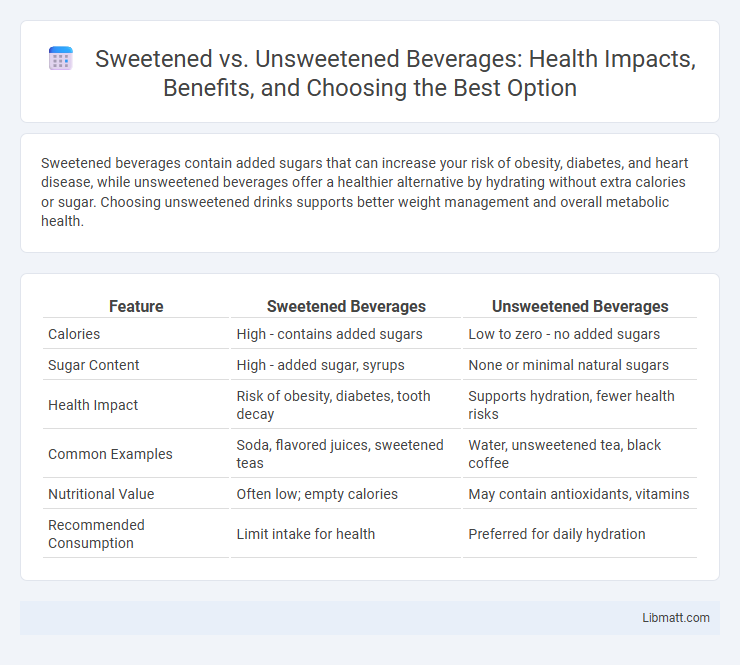Sweetened beverages contain added sugars that can increase your risk of obesity, diabetes, and heart disease, while unsweetened beverages offer a healthier alternative by hydrating without extra calories or sugar. Choosing unsweetened drinks supports better weight management and overall metabolic health.
Table of Comparison
| Feature | Sweetened Beverages | Unsweetened Beverages |
|---|---|---|
| Calories | High - contains added sugars | Low to zero - no added sugars |
| Sugar Content | High - added sugar, syrups | None or minimal natural sugars |
| Health Impact | Risk of obesity, diabetes, tooth decay | Supports hydration, fewer health risks |
| Common Examples | Soda, flavored juices, sweetened teas | Water, unsweetened tea, black coffee |
| Nutritional Value | Often low; empty calories | May contain antioxidants, vitamins |
| Recommended Consumption | Limit intake for health | Preferred for daily hydration |
Introduction to Sweetened and Unsweetened Beverages
Sweetened beverages contain added sugars such as sucrose, high-fructose corn syrup, or natural sweeteners that increase calorie content and impact blood sugar levels. Unsweetened beverages, including water, herbal teas, and black coffee, offer hydration without added calories or sugars, supporting better metabolic health. You can choose unsweetened drinks to reduce sugar intake and promote overall wellness.
Understanding Added Sugars in Drinks
Understanding added sugars in beverages helps you distinguish the health impact of sweetened versus unsweetened drinks. Sweetened beverages often contain high levels of added sugars like high-fructose corn syrup and sucrose, contributing to increased calorie intake and risk of obesity and diabetes. Choosing unsweetened drinks reduces sugar consumption, supports better metabolic health, and aids in maintaining stable blood glucose levels.
Health Impacts of Sweetened Beverages
Sweetened beverages contribute significantly to increased risks of obesity, type 2 diabetes, and heart disease due to their high sugar content and empty calories. Consuming large amounts of added sugars in sodas, energy drinks, and sweetened teas can lead to insulin resistance and inflammation, negatively affecting your metabolic health. Choosing unsweetened beverages helps reduce sugar intake, supporting weight management and lowering the risk of chronic diseases.
Benefits of Unsweetened Beverage Choices
Unsweetened beverages provide hydration without added sugars, reducing calorie intake and lowering the risk of obesity, diabetes, and heart disease. They support better blood sugar control and dental health by avoiding the harmful effects of excess sugar. Choosing unsweetened options helps you maintain a balanced diet while promoting overall wellness and sustained energy levels.
Calorie Comparison: Sweetened vs Unsweetened Drinks
Sweetened beverages typically contain high amounts of added sugars, contributing to a significant calorie increase compared to unsweetened drinks, which have zero to minimal calories. For example, a 12-ounce can of soda can contain around 140 calories, predominantly from sugar, while the same amount of unsweetened iced tea or water has negligible calories. Understanding this calorie comparison helps you make healthier drink choices that support weight management and overall wellness.
Effects on Weight Management
Sweetened beverages contribute to increased calorie intake and higher risk of weight gain due to high sugar content, which can lead to insulin resistance and fat accumulation. Unsweetened beverages, such as water, unsweetened tea, and black coffee, support weight management by providing hydration without added calories. Choosing unsweetened options helps regulate appetite, reduce overall caloric consumption, and promote better metabolic health.
Influence on Blood Sugar and Diabetes Risk
Sweetened beverages cause rapid spikes in blood sugar levels, increasing the risk of insulin resistance and type 2 diabetes. Unsweetened beverages, such as water, herbal tea, or black coffee, help maintain stable blood glucose and reduce diabetes risk. Choosing unsweetened options supports Your overall metabolic health and long-term disease prevention.
Taste Preferences and Consumer Habits
Sweetened beverages often appeal to consumers due to their enhanced flavor profile, driven by added sugars or artificial sweeteners that satisfy cravings for sweetness. Unsweetened beverages attract health-conscious individuals seeking natural flavors without added calories or sugar, influencing a growing trend towards cleaner labels and functional ingredients. Consumer habits reveal a shift towards moderation, with many preferring unsweetened options for hydration while reserving sweetened drinks for occasional indulgence.
Popular Examples of Sweetened vs Unsweetened Beverages
Popular sweetened beverages include soda, fruit juices with added sugar, energy drinks, and sweetened iced teas, all contributing to higher calorie and sugar intake. Common unsweetened beverages consist of water, black coffee, unsweetened tea, and sparkling water without added sweeteners, which provide hydration without extra calories. Choosing unsweetened options can help reduce sugar consumption and support better metabolic health.
Making Healthier Beverage Choices
Choosing unsweetened beverages over sweetened ones significantly reduces added sugar intake, lowering the risk of obesity, type 2 diabetes, and heart disease. Water, unsweetened tea, and black coffee provide hydration without extra calories or artificial ingredients that contribute to metabolic issues. Prioritizing these healthier options supports balanced blood sugar levels and better overall health outcomes.
Sweetened vs unsweetened beverages Infographic

 libmatt.com
libmatt.com